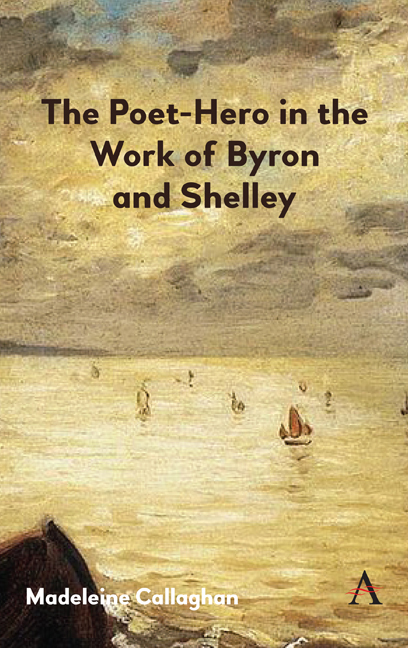Book contents
- Frontmatter
- Dedication
- Contents
- Acknowledgements
- Note on Texts and Abbreviations
- Introduction: The Poet-Hero: ‘Who shall trace the void?’
- Part I Byron
- Interchapter
- Part II Shelley
- Chapter Six ‘The Highest Idealism of Passion and of Power’: Shelley's Heroic Poetics in A Defence of Poetry, The Mask of Anarchy and Prometheus Unbound
- Chapter Seven ‘Holy and Heroic Verse’: The Revolutionary Poet-Heroes of Laon and Cythna
- Chapter Eight ‘This soul out of my soul’: The Trial of the Poet-Hero in Shelley's Epipsychidion
- Chapter Nine ‘His mute voice’: The Two Heroes of Adonais
- Conclusion The Byronic and the Shelleyan Poet-Hero
- Bibliography
- Index
Chapter Six - ‘The Highest Idealism of Passion and of Power’: Shelley's Heroic Poetics in A Defence of Poetry, The Mask of Anarchy and Prometheus Unbound
from Part II - Shelley
Published online by Cambridge University Press: 30 March 2019
- Frontmatter
- Dedication
- Contents
- Acknowledgements
- Note on Texts and Abbreviations
- Introduction: The Poet-Hero: ‘Who shall trace the void?’
- Part I Byron
- Interchapter
- Part II Shelley
- Chapter Six ‘The Highest Idealism of Passion and of Power’: Shelley's Heroic Poetics in A Defence of Poetry, The Mask of Anarchy and Prometheus Unbound
- Chapter Seven ‘Holy and Heroic Verse’: The Revolutionary Poet-Heroes of Laon and Cythna
- Chapter Eight ‘This soul out of my soul’: The Trial of the Poet-Hero in Shelley's Epipsychidion
- Chapter Nine ‘His mute voice’: The Two Heroes of Adonais
- Conclusion The Byronic and the Shelleyan Poet-Hero
- Bibliography
- Index
Summary
A Defence of Poetry is the culminating expression of Shelley's theory of poetry, a prose poem that sings amid its uncertainty, where its force comes from ‘the mixture of ‘as Michael O'Neill writes of Romantic poetry, ‘self-assertion and self-doubt’. Stephen Behrendt views the hallmark of Shelley's work as the creation of the ‘multistable image’, and in A Defence, this is most prominent in Shelley's approach to the role of the poet. For defining the idea of the poet-hero is central to Shelley's poetics. Shelley fashions the poet's heroism as based on the demands of his vocation, where the poet must represent the legislator and the prophet, the temporal and the eternal. Shelley explores the liminal status of poetry, where it seems to be both in and outside of eternity, with the poet accessing ‘the eternal, the infinite and the one’ (A Defence of Poetry, 677) even as he acts as critic of, mirror to or the awakener of the society in which he lives. The poet's ability to act inside and outside of time through ‘the sacred talisman of language’ (Letters: PBS II, 277) renders him heroic, but this is a heroism scrutinized by Shelley. The roles of legislator and prophet, in their temporal and eternal positions, form the poles of the binary that Shelley's fluid and musical prose poem preserves rather than reconciles. The poethero's challenge is to be equal to the demands of both.
Language is at the heart of the heroism Shelley affords to the poet. Shelley's letter to a Lady, dated by F. L. Jones as written in the spring of 1821, where A Defence was written in February and March of the same year, emphasized the power and beauty of language, and A Defence continues to privilege the possibilities of words, adoring and deploring the potential and limitations of language.
- Type
- Chapter
- Information
- The Poet-Hero in the Work of Byron and Shelley , pp. 125 - 146Publisher: Anthem PressPrint publication year: 2019



